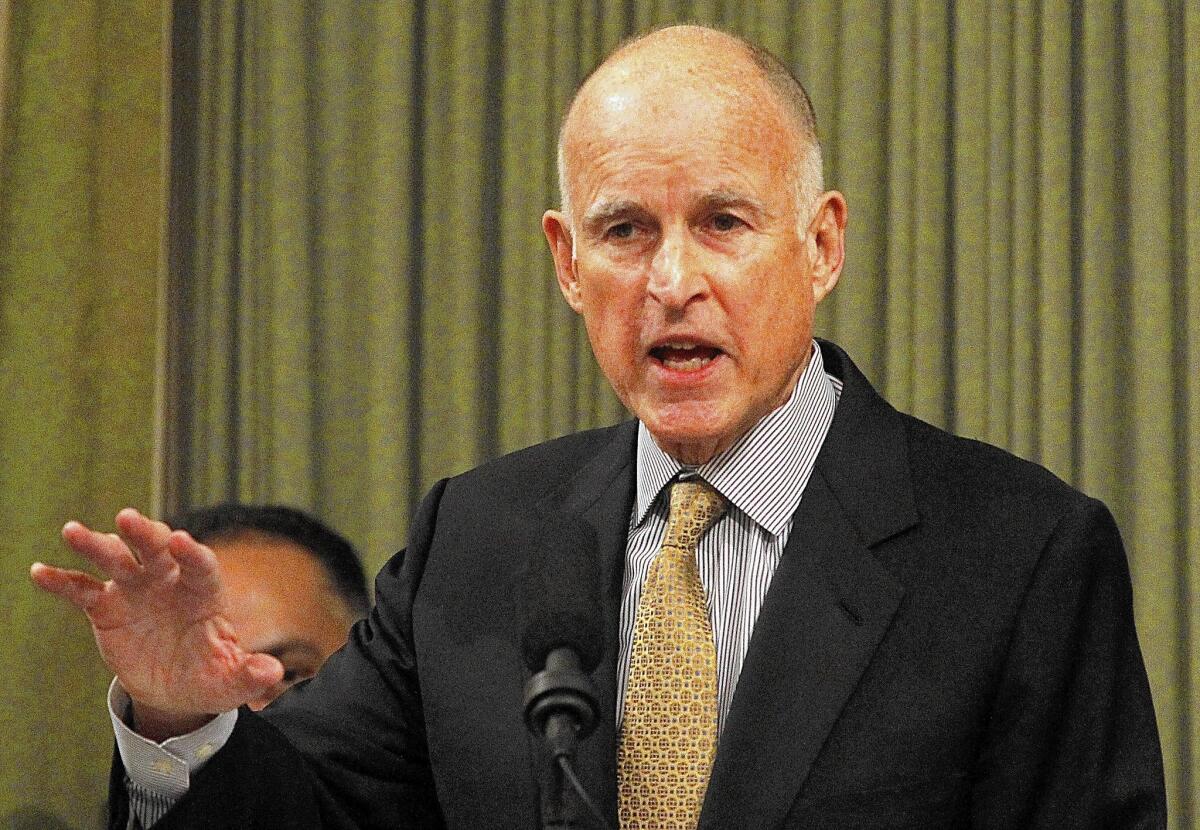Brown signs bill to regulate pumping of underground water

SACRAMENTO — For the first time in its history, California will establish statewide management of water pumped from the ground, under legislation signed Tuesday by Gov. Jerry Brown.
The package of regulations was heralded by supporters as a long-overdue step in changing the state’s laissez-faire approach to underground water sources that can account for up to 60% of Californians’ water supply.
“This is a big deal,” Brown said at a signing ceremony in the Capitol. “It’s been known about for decades that underground water has to be managed and regulated in some way.”
Many farming interests, fearing possible limits on their water use, view the new laws as government overreach. But the plan was praised by environmentalists and water managers.
The state has long been an outlier among its Western neighbors for not regulating underground water. Experts have warned that increasing reliance on underground pumping was harming the state’s aquifers, with more water being drawn from some than was being replaced.
Some areas already manage their groundwater; others do not. Agriculture interests are wary of potential limits on their groundwater access, and until recently lawmakers were loath to be seen as infringing on property owners’ rights.
The state’s current parched conditions made statewide regulation politically possible, Brown said Tuesday.
“We’ve got a drought, and that’s got everybody’s attention,” he said. That context “allows a lot of action to take place in Sacramento that would’ve never happened before.”
The regulatory plan is contained in three bills. SB 1168 by Sen. Fran Pavley (D-Agoura Hills) instructs local agencies to create management plans. A measure by Assemblyman Roger Dickinson (D-Sacramento), AB 1739, establishes when the state can intervene if the local groups don’t do their job satisfactorily.
A third measure, SB 1319, also by Pavley, is intended to allay some farmers’ concerns by postponing state action in places where surface water has been depleted by groundwater pumping.
The legislation won’t offer immediate relief. Because it will take years to craft and implement the management plans, the full effect of the regulations — the recovery of severely over-pumped basins — won’t be felt until at least 2040.
Some in the farming community are in agreement with the new rules, including Miles Reiter, chief executive officer of Driscoll’s, a Watsonville berry farming company.
“It will be a painful process because we have a lot to do,” he said at the signing event. “But it is the only chance we have to continue to farm the extraordinary land that we have available to us and to continue to do our part to feed the world.”
But many Republicans and Central Valley Democrats, along with major farm groups, remain staunchly opposed to the plan.
Paul Wenger, president of the California Farm Bureau Federation, said the bills “may come to be seen as ‘historic’ for all the wrong reasons” by drastically harming food production.
Assemblyman Jim Patterson (R-Fresno) said the legislation did not adequately protect local interests because the state can step in to enforce regulation.
“Waiting in the wings is the all-powerful reach of state government,” Patterson said in an interview. “That should scare anybody.”
He predicted that the regulations would bring lawsuits: “There’s really going to be a wrestling match over who’s going to get the water.”
Brown signed other bills Tuesday as well, including some that pave the way for four new specialty license plate programs.
They include tags promoting kidney disease awareness, created under AB 2450 by Assemblyman Dan Logue (R-Loma Rica), and others bringing attention to domestic violence and sexual assault (AB 2321 by Democratic Assemblyman Jimmy Gomez of Echo Park).
The governor vetoed a measure Tuesday that would have allowed the state’s recycling agency to adopt a standard for labeling plastic products as biodegradable.
In his message rejecting SB 1383 by Sen. Ben Hueso (D-San Diego), Brown said such standards were still being developed and the legislation was premature.
Twitter: @melmason
More to Read
Sign up for Essential California
The most important California stories and recommendations in your inbox every morning.
You may occasionally receive promotional content from the Los Angeles Times.











